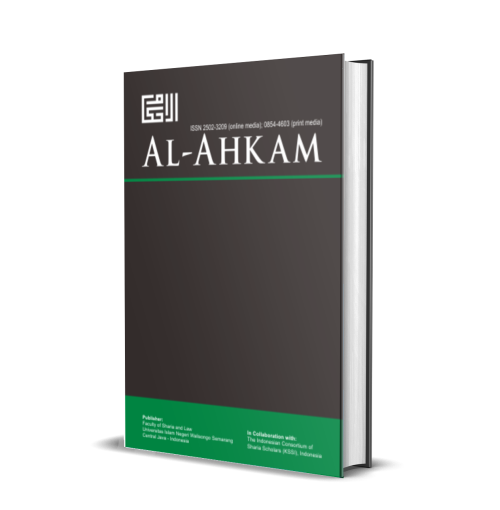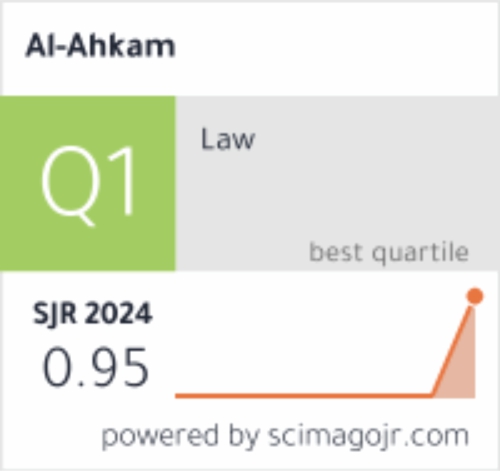ANALISIS NORMATIF-FILOSOFIS FATWA DEWAN SYARI’AH NASIONAL MAJELIS ULAMA’ INDONESIA (DSN-MUI) TENTANG TRANSAKSI JUAL BELI PADA BANK SYARI’AH
DOI:
https://doi.org/10.21580/ahkam.2015.25.2.596Keywords:
DSN-MUI, Jual beli, bank syari’ahAbstract
DSN-MUI uses trade transactions in Islamic financial institutions in order to avoid interest rate system. Moral and legal issues had became the important thing in the formulation of trade transaction in syariah banking, since the concern about the system of interest that still exist in syariah banking’s trade transaction. This means that the trade transaction on syariah banking according to fatwa DSN-MUI still contains usury (riba). This paper intends to explore the important things about the rules and practices of trade transaction on the syariah banking according to DSN-MUI. This study concluded that DSN-MUI performs ijtihād taṭbīqī to facilitate the concept of trade operations on syariah banking. DSN-MUI’s fatwa about trade transaction appears to correspond to a normative concept of fiqh. It's just that there is ambiguity in the salam and istithnā' contract and less attention to the philosophy of trade. The trade transactions were reduced as provision of funds for purchasing of goods, with multi contract institutions. The use of supporting contracts that are not true will potentially lead to morality inconsistencies in trade transactions.Downloads
References
Antonio, Muhammad Syafi'i, Bank Syari’ah Wacana Ulama’ dan Cendekiawan, Jakarta: Central Bank of Indonesia and Tazkia Institut, 1999.
al-‘Asqalānī, Ibnu Ḥajar, Bulūgh al-Marām, Semarang: Maktabah Usaha Keluarga, t.th.
al-Bāqī, Fuad ‘Abd, al-Mu’jam al-Mufahrash li al-Fāẓ al-Qur’ān, Beirut: Dār al-Fikr, 1981.
al-Bukhārī, Imām Abī ‘Abdillāh Muḥammad bin Ismā’īl bin Ibrahīm bin al-Mughīrah bin al-Bardazabat, Jāmi’ al-Ṣaḥīḥ al-Bukhārī, Juz 2, Beirut: Dar al-Fikr, t.th.
al-Dimashqī, Al-Imām Taqiy al-Dīn Abī Bakar bin Muhammad al-Ḥisnī al-Shāfi’ī, Kifāyat al-Akhyār, Dār al-Ihyā’ al-Kutub al-‘Arabiyyah Indunīsī t.th.
DSN-MUI, Fatwa Dewan Syari’ah Nasional, Jakarta: Dewan Syari’ah Nasional-Majelis Ulama’ Indonesia dan Bank Indonesia, 2006.
DSN-MUI, Tanya Jawab Seputar Dewan Syari’ah Nasional Majelis lama’ Indonesia, 2011.
Hasballah, Ali, Uṣūl al-Tashrī’ al-Islāmī, Beirut: Dār al-Fikr t.th.
Ibnu Rushd, Bidāyat al-Mujtahid, Juz.3, Beirut: Dār al-Fikr t.th.
al-Jazīrī, al-Fiqh ‘alā Madhāhib al-Arba’ah, Mesir: Dar al-Ḥadīth, 2004.
al-Kāsānī, al-Imām ‘Alauddin Abī Bakr bin Mas’ūd al-Ḥanāfī, Badāi’ al-Ṣanāi’, Juz.VI, Beirut, Libanon: Dar al-Kutub al-‘Ilmiyyah, t.th.
Ma’lūf, Luis, Munjid, Beirut: Dar al-Masyriq, 1975.
Mūsa, Kāmil, al-Ahkām al-Mu’āmalah, Beirut: Mu’assasah al-Risālah, 1994.
Rofiq, Ahmad, “Kritik Metodologi Formulasi Fikih Indonesia”, dalam Epistemologi Syara’ Mencari Formulasi Baru Fikih Indonesia, Yogyakarta: Pustaka Pelajar.
Sābiq, Sayyid, Fiqh al-Sunnah, Dār al-Fatḥi li A’lām al-‘Arabī, 2009.
Ṡalabī, Muḥammad Muṣṭafā, al-Madkhal fī Ta’rīf al-Fiqh al-Islām wa Qawā’id al-Milkiyyah wa ‘l-‘Uqūdiyyah, t.t.p.: Maṭba’ah Dār al-Ta’rīf, 1964.
al-Ṣan’anī, al-Sayyid al-Imām Muḥammad Ibn Ismā’īl al-Kaḥlānī, Subul al-Salām, Bandung: Dahlan, t.th.
al-Shāfi’ī, Imām Abī ‘Abdillah Muḥammad bin Idrīs, al-Umm, Juz. III, Beirut: Dār al-Fikr, t.th.
Shahrūr, Muhammad, Al-Kitāb wa ‘l-Qur’ān; Qirā’ah Mu’āṣirah, Damaskus: al-Ahalli li ‘l-Ṭūabā’ah wa ‘al-Nashr wa ‘l-Tawzī’, 1990.
al-Sharbinī, Shams al-Dīn Muḥammad bin Muḥammad al-Khaṭib, Mughni al-Mukhtāj, Juz II, t.t.p.: Dār al-Kitāb al-‘Ilmiyyah, t.th.
Shihab, M. Quraish, Membumikan al-Qur’an, Bandung: Mizan, 2009.
UU RI No. 21 tahun 2008, Pasal 4 & 7.
Wawancara dengan Hasanudin, (Sekretaris Badan Pengurus Harian DSN-MUI), tanggal 24 September 2012, di Kantor DSN-MUI Jakarta.
Zahrah, Abū, Uṣūl al-Fiqh, Beirut: Dār al-Fikr, 1985.
al-Zuhaylī, Wahbah, al-Fiqh al-Islām wa Adillatuh, Beirut: Dār al-Fikr al-Ma’āṣir, 2006.
Downloads
Published
How to Cite
Issue
Section
License
By submitting an article to the journal, the author(s) agree to transfer the published article's copyright to the journal, which will act as the publisher. This means the journal will have the right to publish the article in various forms, including reprints. The journal will maintain the publishing rights to the published articles.
In line with the license, authors and third parties (readers, researchers, and others) are allowed to share and adapt the material. In addition, the material must be given appropriate credit, provided with a link to the license, and indicated if changes were made. If authors remix, transform or build upon the material, authors must distribute their contributions under the same license as the original.




